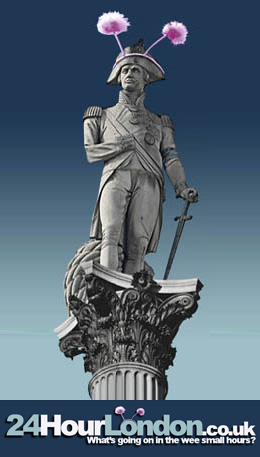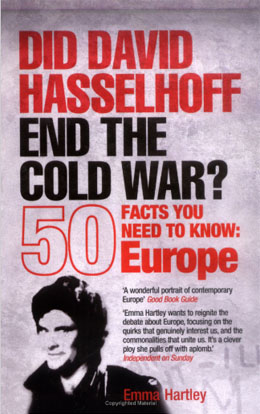His starting point was that he didn't want the names of the judges to be public. "I'm very aware about the better off record companies being able to lobby people on the panel," he said.
Which ones, I asked? I know Seth Lakeman was with EMI but isn't any more as he's struck out on his own. So which large record companies have a foot in the folk scene at the moment?
"I couldn't possibly say which ones," he replied, before mentioning Topic and Proper. However, he later changed his mind about these companies, suggesting that I was putting words into his mouth. I had raised the way in which Topic and Proper seem already to do quite well out of the folk awards, and asked how their influence would increase if the names of the judges were on the record? He wasn't sure but seemed very certain that the forces of capital would do something bad to the judges if their names were to be made public.
He added that another downside of judges making themselves known would be that they might use their position to get free CDs.
There is a list, he explained, of new music sent out to all the judges every year, based on what's been played on the Mike Harding Show (which is also produced by Smooth Operations). I mentioned a comment that was posted under yesterday's blog, from Marjory Carlisle, about two friends of hers who are judges for the folk awards but who, as far as Marjory could see, don't seem to get out and about much. "If they listen to the Mike Harding Show they will hear most things," he said. Then he changed his mind, saying within seconds that "the Mike Harding Show scratches the surface of the folk scene". He also explained that in order to have one's position as a judge rescinded one has to have not filled in the form the previous year.
Discussing the extent to which the relationships between the judges and the nominees are transparent, he emphasised the form that has to be signed every year by the judges, saying that they will not vote for musicians with whom they have a working relationship. But wouldn't it be better, I asked, if the judges - perhaps a different group of people less well-connected in the folk scene - could simply vote for the best contenders?
"I used to think that," he said. "But I was persuaded that I was wrong," adding that this was related to BBC compliance.
In terms of how one is to make a name for oneself on the folk scene, he says that he started out on the folk club circuit when he was 19 and thought it should probably still be done the same way. "I just went around all of these clubs. It's up to a you to get to know all the folk journalists but the first job of a young band is to get themselves a promoter." He named Alan Bearman and Adastra as possibles, adding that "there's one in Scotland".
He also said that he doubted that a young band was entitled to consideration on its merits until it has paid its dues. "If a band is just starting out do you think they are seriously eligible for a folk award?" he asked. Not unless they're really good, I replied. But it would also be good if the structure of the industry and its marketing were transparent enough for them to be able to make their way. Especially since the internet has turned the music industry on its head.
We returned to the idea that only someone wealthy would be able to lobby 170 people, as if it would be expensive. I thought (a) he may not have heard of burning CDs or sound cloud and (b) if your career is at stake you invest in it. This may be a thought that only someone who's had to pay back student loans would take seriously though.
I asked whether he'd heard of a terrific live folk band called The Destroyers. "Why haven't they sent us their album?" he asked. I was really quite surprised. "Perhaps they didn't know who to send it to?" I offered.
They may have done, as far as I know, but they play mainly in cities - not folk clubs - and there is no sign of any kind of management on their website, so they may not be on his radar even though they've been around for five years.
Earlier in the day I'd been sent a link to this page on the BBC website relating to compliance when running BBC awards ceremonies. It makes interesting reading, especially the parts about transparency (near the top) and, section three, about the judging: "The judging system should normally be clearly explained to the audience and must be explained to entrants via on-air/online announcement and the terms and conditions."
There is also a mention of a senior editorial figure who is responsible for making sure that these rules are applied. In the case of the BBC Radio two Folk Awards, this is Fergus Dudley.
If you double click on that it should become legible. I heard from John Leonard first, who said he'd heard from Dudley that I'd been in touch with him too. So I tried again.
* Read the next post about the BBC folk awards
* If you'd like to receive updates from this blog directly into your Facebook news feed, you could *like* its Facebook page. Or follow me on Twitter @emma1hartley









John Leonard is mistaken in saying that the list of suggestions is generated from music played on the Mike Harding Show. It is in fact Smooth Operations best attempt a a list of all the acts which have produced 'folk' CDs (whatever that means) during the year in question. (For example I have always appeared in the list, but never on the MH show).
ReplyDeleteThis anomaly persists in the email sent to judges at the start of the voting process, and in Smooth Operations guide to the Awards (which is not easy to find online - there is no link from the main Awards web page), and was pointed out to John in 2007, so it is surprising to see him making the same error in 2011.
The value of the list of suggestions is anyway debatable. If, as is claimed, the judges are all 'experts' in the folk industry, why should they need a list of suggestions? Likewise, if they need a list of suggestions, should they really be judges?
But if there is a to be list, under the BBC rules it must be based on clearly stated and understandable criteria.
Furthermore, it is not made clear whether only artists who have produced a CD during the current year are eligible for the live and other awards - and this adds a further layer of opacity and potential confusion to the process.
Some of the definitions of the awards are also insufficiently clear, hence why a composed song was nominated as Best Traditional Track, and why a trio was nominated as Best Duo.
However the biggest anomaly is that a panel of more than 150, and a list of potential nominations running into many hundreds, means that artists are regularly nominated on a vote which totals only single figures. Hardly 'Best.'
I'm not a judge or a potential nominee, but I would prefer the process to be robust, transparent and above criticism, which I feel devalues the value of the awards for the winners and the industry.
Tom Bliss
Good comments, Tom. However, I'd be surprised if there's any restriction to artists who have produced an album in the previous 12 months. It doesn't apply to Home Service, for instance, who have released no original material for 16 years yet are nominated in two categories for the 2012 awards, including Best Group. The same applies to several other nominees in various "Best..." categories.
ReplyDeleteUnless live recordings or "best of" albums are considered that is. This year Home Service did release a live album from 1986, so maybe they are being rewarded now for something taped 25 years ago.
Mr Leonard seems confused about how the awards work, what they are trying to reward and why - just like the rest of us!
"I'd be surprised if there's any restriction to artists who have produced an album in the previous 12 months"
ReplyDeleteThat's certainly the case with lifetime achievements, for example, but the wording in some of the notes for guidance does give this impression. It is the lack of clarity, and at times outright contradiction, which causes a problem, rather than the actual rules (whatever they actually are).
Sorry, I should clarify:
ReplyDeleteBecause the list is based on CD releases, I was always mentioned in the years when I produced a CD, but not in the ones when I didn't. This weights the list towards currently recording artists - which may or may not be what is intended (this is not made clear), plus there is nothing to say whether a CD is an actual condition for nomination or not.
I was involved in the nomination stage a couple years ago and I can absolutely state that we were not limited to tracks/artists played on the excellent MH show.
ReplyDeleteThe "previous 12 months" bit applies to relevant activities during that time period. So for the Best Group or Live Act, all that is required is that the group was the best of all the other active groups in that time frame. Being active does not require releasing new material, but that is a very relevant factor in my decision as to which was the best.
For Best Album or Track, only albums or tracks released in that time frame are eligible. Is that clearer?
"I can absolutely state that we were not limited to tracks/artists played on the excellent MH show."
ReplyDeleteIndeed (the guidance does make that clear). And the list is not restricted to suggestions from the Mike Harding show either, which is why it is confusing of John to go on suggesting it is.
"The "previous 12 months" bit applies to relevant activities during that time period"
It does, but the wording could (last time I saw it) be taken to mean that only artists with a CD released in the previous 12 months are eligible for the other awards. It would be better it there was no margin for error.
"Is that clearer?" Not to me, because I was already clear on that point. I'm suggesting that Smooth Operations should routinely make it clear to the judges.
"Being active does not require releasing new material, but that is a very relevant factor in my decision as to which was the best."
It would in mine, too - but the fact remains that the practice of only listing artists who have released a CD could be seen to be unfair on those who have not, and could potentially skew the nominations towards the record company release lists.
I love a good shake up of the old status quo, mainly because it gets people to reflect on and justify how the current state of affairs came about in the first place. Often, no one seems to quite remember, especially if they find themselves sitting smug, nurturing some vested interest that no-one has bothered, or dared, to call them on.
ReplyDeleteAfter following closely how the BBC brought about the untimely demise their best -and certainly most representative- showcases for the folk scene, BBC Radio Derby's much-beloved Folkwaves, I can only conclude that the BBC and its fellow travellers comprise largely of complacent, instinctively nepotistic, yes-men, who barely bother to conceal their disdain for the public they, ahem, serve.
And as for how they treat new artists, don't get me started; Peelism sadly seems to have died with Peel and the philistines hold sway.
"It does, but the wording could (last time I saw it) be taken to mean that only artists with a CD released in the previous 12 months are eligible for the other awards"
ReplyDeleteI disagree. The problem is, we're both basing this on our memory of the wording and I can't find that wording anymore ... the descriptions of the awards used to be readily available on the bbc site. So much for transparency, eh?
The wording makes it clear that the list is absolutely not comprehensive, and that people can vote as they please, you are right abut that.
ReplyDeleteHowever, the fact that the list is compiled from only CD releases rather than, say, CD releases, club guest lists, festival artist lists and arts centre lists, makes it open to attack as lopsided, as many very successful and influential performers are excluded.
You are right about the last of information. I can't find any of it now (though it may be there somewhere), but last time I looked there were some omissions and contradictions.
I support the Awards. I'm comfortable with the people who wind up winning. I'm uncomfortable that the process is not clear, and can be seen to be unfair because it devalues the whole effort.
I have designed awards not unlike these professionally in the past. If Smooth Operations were to publish a comprehensive set of rules and guidance, and then stick to that when asked about them, much of the debate would melt away.
John saying yet again that the list is based on the MIke Harding show gives a totally erroneous impression, and encourages further misunderstanding.
I've no idea why he keep doing it.